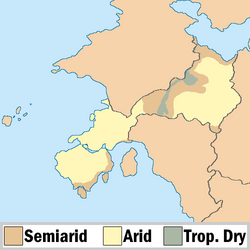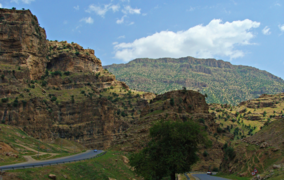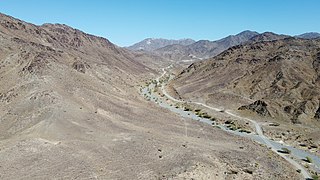Talk:Bulkh
Bulkh= Northern most point: 10.099S, Southern most point: 21.188S Geography_of_Yemen#Climate arid, with bits of semi-arid and highland
Geography

-
Farming in Bulkhan interior
-
Southern mountains, Baqunah Mountain Range
-
Wadi in the Great Kavir desert
-
Coastal community
Bulkh forms the eastern most expanse of the Great Kavir desert and the northwestern Puhktun Sea coast of Daria, the south eastern island of Audonia. It is bound in interior in the northwest by the foothills of the Mahagheh Mountains in the west by the Great Kavir desert, and the Baqunah Mountain Range in the southwest.
Climate and environment

Because it is a coastal state that is on the edge of the The Great Kavir desert Bulkh has three primary climate zones. Arid in the interior and tropical on the coast with a semi-arid interface zone between them. The Baqunah Mountain Range forms a small, high-elevation humid continental zone.
Climate varies greatly within Bulkh. In the highlands, temperatures range between 10 and 20 °C (50 and 68 °F) during cold and hot seasons respectively. The rest of the country has temperatures rarely falling lower than 20 °C (68 °F). The hottest period extends between November and February (25–31 °C or 77.0–87.8 °F) while the coldest period occurs between May and August (15–20 °C or 59–68 °F). Annual temperature is 20 °C (68.0 °F). The climate is cool in high mountainous regions. Coastal Bulkh has two major rainfall periods: one is uni-modal (October–April) and the other is bi-modal (October–December and March–May). The former is experienced in southern and central parts of the country, and the latter is found along the northern coast. The bi-modal rainfall is caused by the seasonal migration of the Intertropical Convergence Zone.
| Climate data for Al Qadria | |||||||||||||
|---|---|---|---|---|---|---|---|---|---|---|---|---|---|
| Month | Jan | Feb | Mar | Apr | May | Jun | Jul | Aug | Sep | Oct | Nov | Dec | Year |
| Record high °C (°F) | 35.0 (95.0) |
35.2 (95.4) |
35.0 (95.0) |
35.0 (95.0) |
32.9 (91.2) |
33.0 (91.4) |
31.8 (89.2) |
31.9 (89.4) |
33.8 (92.8) |
33.7 (92.7) |
34.0 (93.2) |
34.5 (94.1) |
35.2 (95.4) |
| Average high °C (°F) | 31.8 (89.2) |
32.4 (90.3) |
32.1 (89.8) |
30.7 (87.3) |
29.8 (85.6) |
29.3 (84.7) |
28.9 (84.0) |
29.4 (84.9) |
30.3 (86.5) |
30.9 (87.6) |
31.4 (88.5) |
31.6 (88.9) |
30.7 (87.3) |
| Average low °C (°F) | 23.5 (74.3) |
23.3 (73.9) |
22.8 (73.0) |
22.4 (72.3) |
21.3 (70.3) |
19.2 (66.6) |
18.2 (64.8) |
18.1 (64.6) |
18.4 (65.1) |
19.7 (67.5) |
21.3 (70.3) |
22.8 (73.0) |
20.9 (69.6) |
| Record low °C (°F) | 18.1 (64.6) |
18.4 (65.1) |
19.6 (67.3) |
19.6 (67.3) |
16.2 (61.2) |
14.4 (57.9) |
13.7 (56.7) |
12.8 (55.0) |
14.3 (57.7) |
15.8 (60.4) |
17.6 (63.7) |
18.8 (65.8) |
12.8 (55.0) |
| Average rainfall mm (inches) | 76.3 (3.00) |
54.9 (2.16) |
138.1 (5.44) |
254.2 (10.01) |
197.8 (7.79) |
42.9 (1.69) |
25.6 (1.01) |
24.1 (0.95) |
22.8 (0.90) |
69.3 (2.73) |
125.9 (4.96) |
117.8 (4.64) |
1,149.7 (45.26) |
| Average rainy days (≥ 1.0 mm) | 7 | 4 | 11 | 18 | 13 | 5 | 4 | 4 | 3 | 5 | 8 | 9 | 91 |
| Average relative humidity (%) | 77 | 76 | 80 | 84 | 81 | 78 | 77 | 76 | 75 | 76 | 78 | 78 | 79 |
| Mean monthly sunshine hours | 235.6 | 223.2 | 213.9 | 156.0 | 213.9 | 222.0 | 223.2 | 266.6 | 252.0 | 275.9 | 252.0 | 241.8 | 2,776.1 |
| Mean daily sunshine hours | 7.6 | 7.9 | 6.9 | 5.2 | 6.9 | 7.4 | 7.2 | 8.6 | 8.4 | 8.9 | 8.4 | 7.8 | 7.6 |
| [citation needed] | |||||||||||||
Government and Politics
Bulkh is a secular Consociational democratically elected oligarchic state with power being shared by the elites of the majority Muslim Arab community (68% of the population) and the minority Christian (20% of the population) and Bedouin (12% of the population) communities. Representatives to the Constituent Council are directly elected by their constituency and serve for a term of 3 years. There is a 4 term limit to service on the Constituent Council.
From within the elected members of the legislative body a Most Elected Minister is elected for a 6 year period to serve as the head of the executive branch. There are no term limits to the Executive branch.
Federal subdivisions
Buhlk is divided into 5 provinces and a Federal District.
- The Federal District
- Southern coastal region to be named
- Central coastal region to be named
- Northern coastal region to be named
- Northern half of the interior
- Southern half of the interior
Politics
What political factions exist? Who has ruled predominantly?
Law
What kind of laws and legal system does your country employ?
Demographics
What kind of people live in your country?
Ethnicity
What ethnic groups make up your country?
Language
What language or languages do your country's people use? Are there any previously used languages no longer common? Are these languages native to your country or shared with another?
Religion
Religious affiliations in Bulkh (2031)
The population in Bulkh are majority Muslim with 68% population professing that faith. Of those 59% are of the Sunni branch of Islam and 9% are of the Shia branch. There is a long history of sectarian violence between the two factions, which was exploited by the during the Bourgondii Royal Trading Company during the Kandahari-Pukhtun colony and the Bulkhawan Presidency. The majority of Shia Muslims were pushed into newighboring Umardwal which is a majority Shia nation. In modern Bulkh, especially since secularization in the latter half of the 20th century, sectarian violence has almost entirely disappeared, but it does rear its ugly head when there are times of uncertainty and upheaval.
Also as a result of colonization there is a sizable Christian minority in Bulkh, around 20% of the total population. The Calvinist faiths, predominately Mercantile Reform Protestantism, because Bulkh was colonized as a Pharisedom, are chief among them, 15% of the total population. However, there is a Catholic populace in the country as well. The Archbishop of Bulkh is Farajallah bin Tawil. He oversees three Dioceses, the Diocese of al-Qadria which covers the southern half of the coastal region, led by Bishop Ikram bin Idris; the Dioceses of Port Abultah which covers the northern half of the coast, led by Bishop Naadir el-Arafat; and the Diocese of Tel Kernah, the interior diocese, led by Bishop Thaamir bin Tamer. During the colonial period the Christian population was a much larger portion of the total population but after the departure fo the Bergendii in the 1830s the faith dwindled significantly both through reprisal killings and also mass conversions. The percentage of Bulkhan's self-reporting as Christian has increased significantly since Operation Kipling in the 1960s, 70s, and early 80s. Interaction with large numbers of Bergendii and Urcean soldiers, diplomats, and business persons made it en vogue and modern to convert to a form of Christianity, especially in the more affluent and intellectual circles.
Education
How many people in your country are educated?
Culture and Society
What do your people do, and what are they like?
Education
What is your country's education system like? How do the schools work? What do people think about education?
Attitudes and worldview
How do your country's people view life?
Kinship and family
How are families or kinship groups structured in your country?
Cuisine
What do your people eat?
Religion
What do your people believe? Rather than demographics, as above, think about how important religion is to your people and their view about their own and other religions. What is the relationship between the prevailing view and minority religious groups? Is it an official religion, and do any laws exist about free worship?
Arts and Literature
What type of art do your people make? Do they have a tradition of painted art, well-crafted television shows, or great music?
Sports
Does your country have any major sports leagues? What types of sports are played, both professionally and for fun by your country's people?"
Symbols
Are there any prominent symbols which are well known to represent your country?



